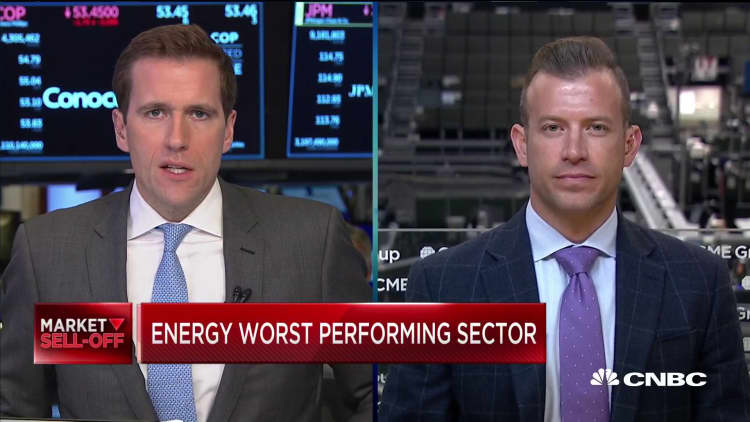The Sierra Club has filed a lawsuit challenging the Securities and Exchange Commission for its failure to respond to a Freedom of Information Act (FOIA) request and disclose documents regarding what the environmental group called the agency's "unprecedented rejections, on behalf of corporate polluters, of climate-related shareholder resolutions aimed at reducing harmful pollution, or adopting corporate sustainability and climate goals."
Climate resolutions introduced by shareholders for annual meetings of companies have risen in recent years, but the SEC's rejection of these proposals using what is called no-action letter relief have also increased under Trump administration. The agency has allowed companies not to hold votes on at least 12 climate-related shareholder resolutions in the last 18 months, including one that, if passed, would have compelled Exxon Mobil to disclose emissions targets in line with the Paris Climate Agreement.
Before that, a 2018 shareholder resolution planned at EOG Resources was blocked by company with the SEC's approval, and the agency saying in its no-action letter that the resolution "seeks to micromanage the Company by probing too deeply into matters of a complex nature which shareholders, as a group, would not be a in a position to make an informed judgment."
The lawsuit states that was the first time the SEC issued a no-action letter on the issue of greenhouse gas emission targets. The details of that claim are important to understand, according to Heidi Welsh, executive director of the Sustainable Investments Institute. Walsh explained that a few earlier proposals that asked for "net-zero" climate goals had been blocked by the SEC on the grounds that they were too specific and would "micromanage" a company and therefore constitute "ordinary business", which is the most commonly cited reason companies cite and use to block proposals.
But Welsh said the EOG proposal was the first to be blocked which asked for greenhouse goals generally.
"This proposal or very similar iterations of it had gone to votes more than 100 times previously, earning increasing levels of support from investors. What made the EOG no-action letter notable was that it marked a clear shift in the SEC staff's interpretation of greenhouse gas goals proposals. The SEC staff now appears to think that if a proposal mentions goals and any sort of timeframe, it is too specific and may be excluded. This is definitely new."
The Sierra Club filed the lawsuit in the U.S. District Court for the Northern District of California after the SEC failed to comply with a FOIA request made in April seeking records to help explain the rejections of shareholder proposals relating to climate change. Sierra Club Senior attorney Joshua Smith said in a statement, "Trump's SEC is determined to leave the public in the dark and has ignored repeated inquiries about the status of this information."
The Securities and Exchange Commission declined to comment.
The Sierra Club says in its lawsuit that the SEC, after initially communicating with the environmental group that the request was in the public interest and granting the Sierra Club a filing fee waiver, later said it had to reclassify the FOIA request under a more complex treatment given the number of documents to review and that meant it could not even begin to process the request for three years.
The SEC revised its estimate of responsive documents three times in all, according to the lawsuit — from 2,000 emails containing about two pages per email (i.e., 4,000 pages), to 9,852 pages, and then to over 200,000 pages.
The Sierra Club alleges that the SEC, "has demonstrated a pattern and practice of failing to comply with FOIA requests by improperly using 'complex track' determinations to shield itself from complying with lawful requests, and thereby to undermine the purpose of the Act."
Sierra Club's recent record of legal success
The Sierra Club has a recent history of success litigating FOIA issues against the Trump administration. It sued the Environmental Protection Agency after FOIA requests made under former Trump EPA director Scott Pruitt were ignored, and the ultimate release of those documents — which revealed a complicated web of relationships — played a role in Pruitt's exit from the agency.
Pruitt told CNBC's "Squawk Box" in 2017 that humans were not a "primary contributor to the global warming that we see."
That appearance led to a separate FOIA request from Public Employees for Environmental Responsibility, seeking the studies Pruitt used to make his claims. The EPA also fought that request, but a U.S. District Court for the District of Columbia ultimately ordered the agency to produce scientific evidence to support the claim.
In early 2019 a federal court ruled again in favor of the Sierra Club saying the EPA must release 20,000 pages of emails, as well as calendars, of EPA officials involved in rollbacks of public health and environmental standards. The court noted in that case that "some of the revelations that prompted the Administrator [Scott Pruitt] to resign in July 2018 came to light through the EPA's response to [Sierra Club's] earlier FOIA requests."
Earlier this month the Sierra Club sued the EPA again over statements made by current administrator Andrew Wheeler, a former coal lobbyist, who claimed that climate change "is 50 to 75 years out," but failed to produce documents to support that claim.
Shareholder support for climate has surged
Even though 30% shareholder support for climate proposals in 2019 was a record, the number of resolutions coming to a vote declined significantly, according to Morningstar data. Many proposed resolutions were withdrawn because shareholders felt dialogue with management was constructive. But some resolutions, including the one proposed by Exxon Mobil shareholders, were removed from proxy ballots in 2019 as a result of Securities and Exchange Commission rulings to allow management to exclude.
The issue of climate resolutions remains a complex one. The two largest asset managers in the U.S., Vanguard Group and BlackRock, have broken with the rest of the asset management industry in favoring an approach of direct engagement with corporate management teams rather than proxy votes as their primary means of influence.
In its proxy voting guidelines Vanguard says that while it supports climate disclosures and industry-specific standards, it is not likely to vote for climate resolutions that attempt to set "overly prescriptive" goals for companies. Requested adoption of "targets or goals" are voted on a case-by-cases basis, it states. Both companies joined a 2017 shareholder vote to require Exxon Mobil to produce a climate report, and their votes were considered essential to the measure passing, but the report produced by Exxon Mobil was considered disappointing by many shareholders, and BlackRock and Vanguard's voting records on climate resolutions since show very low support compared to fund industry peers.
This week a landmark lawsuit against Exxon Mobil over allegations it hid its knowledge of climate change from shareholders began in New York City.
One of the five SEC commissioners, Republican Hester Peirce, is a critic of shareholder resolutions, as well as environmental, social and governance practices for investing and corporations. In a speech in June before the conservative business lobby the American Enterprise Institute she referred to "peddlers of ESG products and philosophies."
She also said in a speech in March before the Council of Institutional Investors that the reform of shareholder proposals was needed, and that "current thresholds permit, indeed encourage, a handful of shareholders to put forward proposals that incur considerable costs borne by all shareholders. Shareholders are able to submit losing proposals over and over again. In recent years, many of these proposals are not even related to core corporate governance issues, but instead promote a tiny group of shareholders' personal political and social preferences."
Welsh said the tightened interpretation used in no-action letters disproportionately affects climate proposals. Taken together with a new rulemaking proposal expected from the SEC in the next few months about the shareholder resolution process, which many believe will make it harder to propose resolutions and resubmit them, concerns have grown about a significant curtailing of shareholder voices. "That's the core issue at stake here," she said.
But Welsh added that as the SEC makes it more difficult to file shareholders resolutions, investors will not go away but pursue other methods of achieving their goals, such as lawsuits.

This story has been updated with comments from Heidi Welsh, executive director of the Sustainable Investments Institute.





